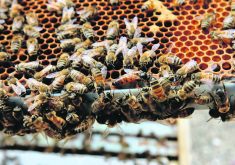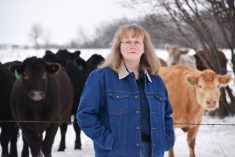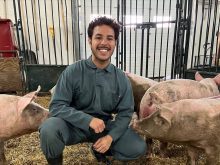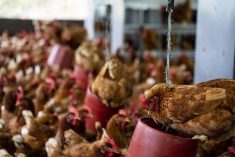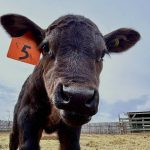Any beef producer who doesn’t have a formalized working relationship with a veterinarian must have one by December 1, or risk finding out the hard way they can’t buy antibiotics they may need.
After that date, you’ll need a vet’s prescription to buy virtually any antibiotic needed on the farm, as all over-the-counter purchases are prohibited.
Glenboro veterinarian Dr. Wayne Tomlinson was at the District 9 meeting of Manitoba Beef Producers to hammer home that message last week — lest anyone hasn’t heard it.
Read Also

Canada’s import ban on Avix bird control system ruffles feathers
Canadian producers’ access to Bird Control Group’s Avix laser system remains blocked despite efficacy studies and certifications, as avian flu deaths rise.
By now, most should know the veterinary-client-patient-relationship (VCPR) is critical to be able to buy these medicines, as veterinarians fulfil their obligations for oversight of all medically important antimicrobials, Tomlinson said, adding he expected most attending that meeting do.
It’s the few who don’t yet know, and are in for a shock, that’s the worry.
“Because the last thing that we want as veterinarians, and the last thing that Manitoba Beef Producers wants, is a whole bunch of calls from somebody who’s been driving down the road and seeing a whole bunch of sick and limping animals that aren’t being treated well… and the producer saying, ‘yeah, but I couldn’t buy any penicillin for them.’”
Tomlinson’s talk reiterated Canada’s obligations to preserve the efficacy of antimicrobials in veterinary and human medicine, as part of the federal framework for action on antimicrobial resistance and use in Canada. Veterinary oversight of all medically important antimicrobials given to animals in their feed or water has been required since December 2016 as part of that action plan.
Health Canada’s intent “is not to pick on beef producers or swine producers,” he said. Rather it’s part of Canada’s overall commitment and effort to reduce use of antimicrobials important to humans in treating livestock and companion animals. That’s part of a much larger, global effort to slow the spread of antimicrobial resistance (AMR). It’s in the interest of the livestock industry to preserve the efficacy of antimicrobials, said Tomlinson.
“Health Canada believes we can attain the same level of animal welfare and use less antibiotics,” he said, adding it’s an approach focused on ‘right drug for the right reason for the right patient (at the) right dose, right time, for right duration with the right records.
“Like I said at the start, antibiotics, according to Health Canada, are a privilege. They’re not a right. And they’re not afraid, if we can’t look after them properly, to take this privilege away from us.”
What’s absolutely key right now is that every producer knows this new approach means that after Dec. 1 no more over-the-counter sales of any medically important antimicrobials are permitted — and that if and when they do require prescriptions they can only get them from a veterinarian with whom they have that formalized, working relationship.
The Canadian Veterinary Medical Association (CVMA) defines a legitimate VCPR as supported by evidence of “relevant and timely interactions with clients and their animals such as farm visits, clinic appointments, consultations, individual animal or herd examinations, lab reports or production record reviews, sufficient to show the veterinarian has taken the steps necessary to establish medical need to prescribe and dispense pharmaceuticals.”
These protocols will not reduce access to antimicrobials nor limit what people can keep on hand, Tomlinson stressed. Prescriptions will also make provision for refills as before.
“If you have a prescription you can get it filled anywhere they’re sold… it doesn’t have to be the person who wrote it.”
But there will be no more over-the-counter sales of any medically important antimicrobial, and veterinary oversight is tightening, requiring all clinical veterinarians now additionally write out a script of their diagnoses and prescribed treatments and provide same to the client, as well.
His ‘take-home message’ Tomlinson stressed repeatedly is make sure you have that VCPR to ensure continued access to prescriptions when needed.
“This is all about public trust.”
Lake Francis beef producer Dianne Riding, District 9 director and secretary at last week’s meeting said MBP does not want to see anyone left uninformed about all of this.
“Most already do know they have to have that VCPR but we still have some who do not,” she said.
“We’re hoping tonight that those who have come will go back and tell their neighbours ‘we’re not going to lose our drugs. We just need to go and work with our veterinarians.’”
The Beef Cattle Research Council will host a webinar on November 14 to go delve into the details around what working with the vet means, purchasing medicated feed and understanding the facts about antibiotic use and resistance in Canadian beef cattle. More information or to register is found on its website.




